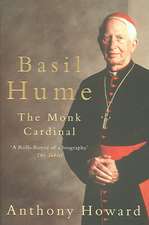Form, Style and Meaning in Byzantine Church Architecture: Variorum Collected Studies
Autor Hans Buchwalden Limba Engleză Hardback – 22 noi 1999
Din seria Variorum Collected Studies
-
 Preț: 313.38 lei
Preț: 313.38 lei -
 Preț: 311.41 lei
Preț: 311.41 lei -
 Preț: 299.55 lei
Preț: 299.55 lei -
 Preț: 325.68 lei
Preț: 325.68 lei -
 Preț: 406.12 lei
Preț: 406.12 lei -
 Preț: 311.18 lei
Preț: 311.18 lei -
 Preț: 325.31 lei
Preț: 325.31 lei -
 Preț: 396.01 lei
Preț: 396.01 lei - 9%
 Preț: 1039.89 lei
Preț: 1039.89 lei -
 Preț: 266.20 lei
Preț: 266.20 lei -
 Preț: 343.34 lei
Preț: 343.34 lei - 9%
 Preț: 938.10 lei
Preț: 938.10 lei -
 Preț: 351.48 lei
Preț: 351.48 lei - 9%
 Preț: 938.86 lei
Preț: 938.86 lei -
 Preț: 335.37 lei
Preț: 335.37 lei - 9%
 Preț: 937.14 lei
Preț: 937.14 lei -
 Preț: 351.42 lei
Preț: 351.42 lei -
 Preț: 320.00 lei
Preț: 320.00 lei - 38%
 Preț: 766.84 lei
Preț: 766.84 lei - 23%
 Preț: 315.48 lei
Preț: 315.48 lei - 36%
 Preț: 740.06 lei
Preț: 740.06 lei - 34%
 Preț: 764.20 lei
Preț: 764.20 lei - 39%
 Preț: 684.75 lei
Preț: 684.75 lei - 29%
 Preț: 247.40 lei
Preț: 247.40 lei - 37%
 Preț: 488.89 lei
Preț: 488.89 lei - 38%
 Preț: 766.91 lei
Preț: 766.91 lei - 34%
 Preț: 769.51 lei
Preț: 769.51 lei - 38%
 Preț: 769.85 lei
Preț: 769.85 lei - 36%
 Preț: 823.43 lei
Preț: 823.43 lei - 25%
 Preț: 225.28 lei
Preț: 225.28 lei - 25%
 Preț: 225.54 lei
Preț: 225.54 lei - 34%
 Preț: 767.07 lei
Preț: 767.07 lei - 34%
 Preț: 764.20 lei
Preț: 764.20 lei - 34%
 Preț: 736.38 lei
Preț: 736.38 lei - 34%
 Preț: 738.43 lei
Preț: 738.43 lei - 25%
 Preț: 226.52 lei
Preț: 226.52 lei - 33%
 Preț: 491.66 lei
Preț: 491.66 lei - 34%
 Preț: 485.78 lei
Preț: 485.78 lei - 34%
 Preț: 485.78 lei
Preț: 485.78 lei - 38%
 Preț: 766.34 lei
Preț: 766.34 lei - 36%
 Preț: 739.17 lei
Preț: 739.17 lei - 31%
 Preț: 473.94 lei
Preț: 473.94 lei - 18%
 Preț: 843.63 lei
Preț: 843.63 lei - 38%
 Preț: 774.91 lei
Preț: 774.91 lei - 38%
 Preț: 769.92 lei
Preț: 769.92 lei - 50%
 Preț: 488.81 lei
Preț: 488.81 lei - 36%
 Preț: 488.49 lei
Preț: 488.49 lei - 34%
 Preț: 769.10 lei
Preț: 769.10 lei - 38%
 Preț: 766.99 lei
Preț: 766.99 lei
Preț: 764.20 lei
Preț vechi: 1154.59 lei
-34% Nou
Puncte Express: 1146
Preț estimativ în valută:
146.22€ • 152.69$ • 120.75£
146.22€ • 152.69$ • 120.75£
Carte tipărită la comandă
Livrare economică 15-29 aprilie
Preluare comenzi: 021 569.72.76
Specificații
ISBN-13: 9780860787792
ISBN-10: 0860787796
Pagini: 352
Dimensiuni: 169 x 244 mm
Greutate: 0.45 kg
Ediția:1
Editura: Taylor & Francis
Colecția Routledge
Seria Variorum Collected Studies
Locul publicării:Oxford, United Kingdom
ISBN-10: 0860787796
Pagini: 352
Dimensiuni: 169 x 244 mm
Greutate: 0.45 kg
Ediția:1
Editura: Taylor & Francis
Colecția Routledge
Seria Variorum Collected Studies
Locul publicării:Oxford, United Kingdom
Cuprins
Contents: Part one: Individual Buildings: Saint Sophia, turning point in the development of Byzantine architecture?; The church of St John the Theologian in Alaehir (Philadelphia); Sardis Church E - a preliminary report; Part two: Architectural Forms in Asia Minor: Notes on the design of aisled basilicas in Asia Minor; Western Asia Minor as a generator of architectural forms in the Byzantine period, provincial back-wash or dynamic centre of production?; Lascarid architecture; Part three: Questions of Style and meaning: The concept of style in Byzantine architecture; Retrofit-hallmark of Byzantine architecture?; The first Byzantine architectural style: evolution or revolution?; Criteria for the evaluation of transitional Byzantine architecture; The geometry of Middle Byzantine Churches and some possible implications; Index.
Recenzii
'...a refreshing and valuable approach...refreshing, because more and more often art historians are dispensing with the study of objects. Buchwald's formal observations demonstrate, however, the potential value of such inquiry. His formal analysis of Constantinian basilicas is a brilliant example of his subtle and nuanced reading of the architecture... The essays do indeed provide a worthwhile perspective on aesthetics, and I recommend them to all medieval architecture historians.... Books like these help us to be constructively self-conscious.' Aurora
Descriere
Using detailed analyses of individual buildings as a point of departure, Professor Buchwald here examines various approaches to Byzantine architectural forms, and raises questions concerning the use of stylistic and other forms of analysis. One group of articles focuses on stylistic currents in Asia Minor, including that of the 13th-century Lascarid dynasty, previously unknown. Others explore methods which appear to have been used in the design of Byzantine churches, such as dimensional ’rules of thumb’, modular and geometric systems of proportion, and the quadratura, hitherto recognised only in Western architecture. The final essays pose further questions: what were the goals and achievements of Byzantine architects, when they transformed older existing buildings? How, and why, did they use stereometric Euclidean geometry? And was there any ultimately Platonic connection?
















